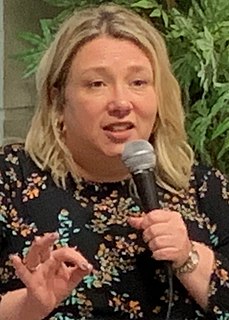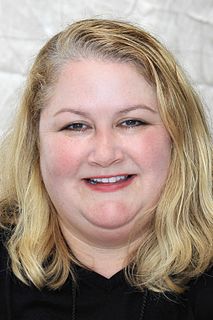A Quote by Gail Honeyman
'Eleanor' was so much fun to write, because there's a brutal honesty about her. She's got no filters and no concept of social norms.
Related Quotes
Eleanor Roosevelt's very helpful to a lot of children who cannot speak French, who do not write well. And Marie Souvestre is fierce. She tears up students' papers that are not, you know, perfect. And Eleanor Roosevelt goes around, again, being incredibly helpful to children in need, children in trouble. And her best friends are the naughtiest girls who are in trouble. And she is a leader. And she is encouraged to be a leader. And everybody falls in love with her. She's a star.
Eleanor Roosevelt loved to write. She was a wonderful child writer. I mean, she wrote beautiful essays and stories as a child. And Marie Souvestre really appreciated Eleanor Roosevelt's talents and encouraged her talents. Also, she spoke perfect French. She grew up speaking French. She's now at a french-speaking school where, you know, girls are coming from all over the world. Not everybody speaks French.
Well, when Eleanor Roosevelt's mother dies, she goes to live with her Grandmother Hall. And her Grandmother Hall is in mourning. She's in widow's weeds. She's in her 50s, but appears very old. And she's exhausted from raising rather out-of-control children. Her favorite daughter, Anna, has died (Eleanor's mother), and she has living at home two other sons, Vallie and Eddie. And they are incredible sportsmen, incredible drinkers, out-of-control alcoholics.
I think she [Eleanor Roosevelt] never was called because she probably didn't know an awful lot. The whole burden of the criticism of her on the subject of Communism is naiveté, not participation. And again, being a public figure and our representative at the UN, there was nothing Communist about her, certainly.
I mean, her father was an alcoholic, and her mother was the suffering wife of a man who she could never predict what he would do, where he would be, who he would be. And it's sort of interesting because Eleanor Roosevelt never writes about her mother's agony. She only writes about her father's agony. But her whole life is dedicated to making it better for people in the kind of need and pain and anguish that her mother was in.
That was a general impression that one got, that she [Eleanor Roosevelt] was always flitting around the country and descending on some place in the Ozarks that she decided was disadvantaged, and announcing that something had to be done. And she had a very active social conscience, which I think in general is to her credit, although it tended, as many people thought, to just be overdone to the point where it gave rise to this crack that she regarded the whole world as one vast slum project
In one way, it is this sense of order and also love that, I think, really saved Eleanor Roosevelt's life. And in her own writing, she's very warm about her grandmother, even though, if you look at contemporary accounts, they're accounts of horror at the Dickensian scene that Tivoli represents: bleak and drear and dark and unhappy. But Eleanor Roosevelt in her own writings is not very unhappy about Tivoli.
Look at poor Nirupa Roy. She got substantial roles, but at 30 they made her put grey in her hair. And Achala Sachdev was all of 16 when she played 60. She quit because she got nightmares about dropping a thali and screaming, 'Nahin!' You know an actor or any other human being needs to be comfortable in her space at whatever age she is.






























